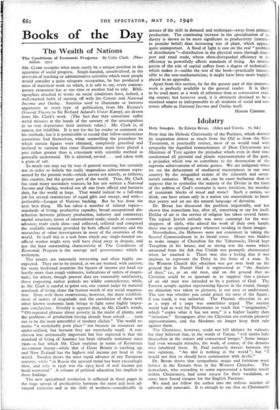Books of the Day
The Wealth of Nations
The Conditions of Economic Progress. By Colin Clark. (Mac- millan. 25s.)
MR. C.LARR occupies what must surely be a unique position in the apparatus of social progress. Single-handed, unsubsidised, in the intervals of teaching or administrative activities which most people would consider a quite adequate occupation, he has produced a mass of statistical work on which, it is safe to say, every contem- porary economist has at one time or another had to rely. Bibli- ographies attached to works on social conditions have, indeed, a well-marked habit of starting off with the Census and National Income and Outlay. Statistics used to illuminate or buttress arguments in every type of publication, from Mr. Keynes's General Theory to Sir Richard Aeland's Unser Kampf, are drawn from Mr. Clark's work. (The fact that they sometimes suffer weird misuses at the hands of the unwary or the unscrupulous in no way depreciates their intrinsic value.) Mr. Clark is, of course, not infallible. It is not for the lay reader to comment on his methods, but it is permissible to record that fellow-statisticians sometimes find themselves, when unravelling the procedure by which certain figures were obtained, completely gravelled and inclined to surmise that inner illumination must have played a part rather greater than is consonant with scientific method as generally understood. He is admired, envied . . . and taken with a grain of salt.
So much one may say by way of general warning, but certainly not in order to belittle the really stupendous achievement repre- sented by the present work—which covers not merely, as hitherto, this country, but the greater part of the world. True, Mr. Clark has used many secondary sources; he has not written a National Income and Outlay, worked out ab ova from official and business data, for the world at large. That would indeed be a full-time job for several statisticians of equal gifts and energy, and with- preferably—League of Nations backing. But he has done the next best thing. He has taken a number of related topics—. standards of living; productive capacity; broad occupational dis- tribution between primary production, industry and commerce; -capital structure; terms of international trade; trends of economic advance; trade cycle data—and collected, collated • and compared the available material provided by both official statistics and the researches of other investigators in most of the countries of the world. In itself this is a task from which any single-handed un- official worker might very well have shied away in despair, and not the least outstanding characteristic of The Conditions of Economic Progress is the courage and perseverance which it evidences.
The results are extremely interesting and often highly un- expected. They are to be treated, as we are warned, with caution; for many backward countries the figures of income per head are hardly more than rough estimates, indications of orders of magni- tude; for others, though present data are reasonably satisfactory, those respecting earlier periods are wildly contradictory; while, as Mr. Clark is careful to point out, one cannot judge by material standards of living alone the human worth of any social organisa- tion. Even with these reservations, however, the mere establish-. ment of orders of magnitude and the correlation of these with other known economic facts brings to light some highly impor- tant conclusions. Notably it appears that, in Mr. Clark's words, "Oft-repeated phrases about poverty in the midst of plenty, and the problems of production having already been solved . . . turn out to be the most untruthful of modern clichés." The world re- mains "a wretchedly poor place" not because its resources are under-utilised, but because they are wretchedly small. A con- clusion less intrinsically important but less expected is that the standard of living of America has been virtually stationary since t9oo—a fact which Mr. Clark explains in terms of Keynesian investment theory—while that of Great Britain is catching up, and New Zealand has the highest real income per head in the world. Sweden shows the most rapid advance of any European country, while "in Russia the upward trend has been exceedingly slow, and only in 1936 was the 1913 level of real income per head recovered." A volume of political education lies implicit in these findings.
The new agricultural revolution is reflected in these pages in the huge spread of productivity between the most and least ad- vanced countries and in the shift of workers—considerably in arrears of the shift in demand and technique—away from primary production. The continuing increase in the specialisation of in- dustry is shown to be more significant to productivity (contrary to pooular belief) than increasing size of plant, which appeals quite unimportant. A flood of light is cast on the real "problem of distribution "—distribution in the physical sense through trans- port and retail trade, whose often-disregarded efficiency or in- efficiency so powerfully affects standards of living. An investi- gation of the role of capital suffers from a degree of technicality which makes it—unlike the rest of the book—practically inacces- sible to the non-mathematician; it might have been more happily placed in an appendix.
Apart from this section, by far the greater part of this immense work is perfectly available to the general reader. It is likely to be used more as a work of reference than as consecutive read- ing matter; but however used, it is obviously destined to be a standard source as indispensable to all students of social and eco- nomic affairs as National Income and Outlay itself.
HONOR CROOME.






























 Previous page
Previous page